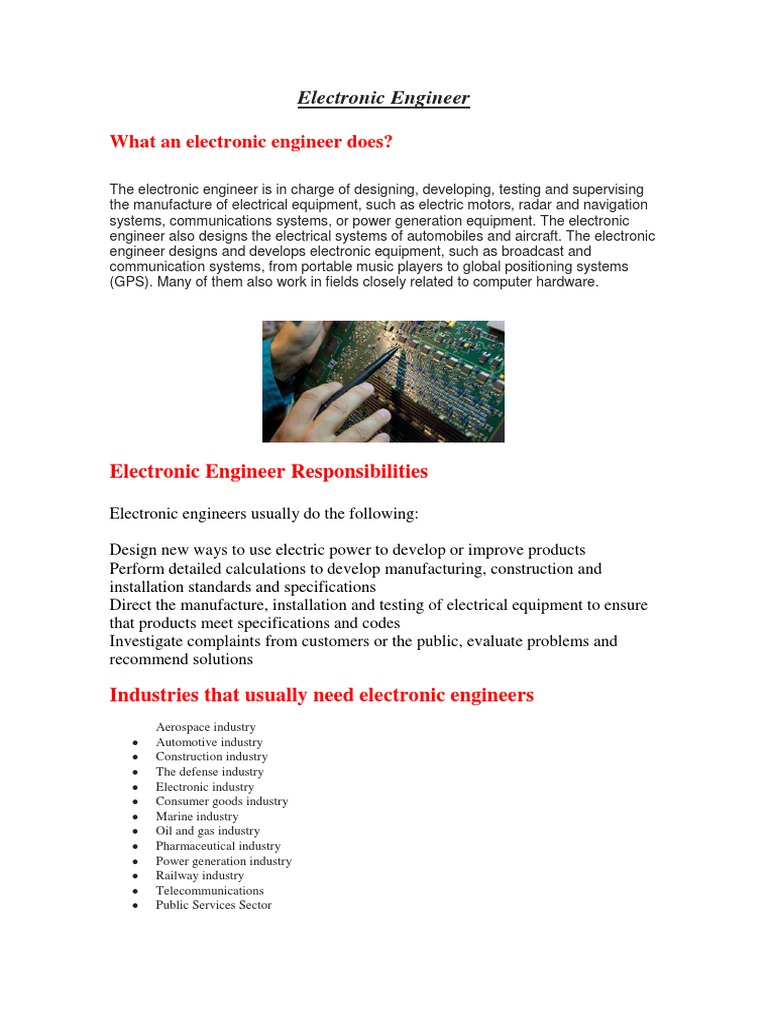Electronics engineering is a dynamic and multifaceted discipline that demands a diverse skill set and a comprehensive understanding of various principles and technologies. It is a field that offers a myriad of opportunities and challenges, much like a puzzle waiting to be solved. So, what are the indispensable elements that an electronics engineer must know to excel in this ever-evolving arena? This exploration delves into the core competencies and knowledge areas essential for any aspiring or practicing electronics engineer.
The first pillar of electronics engineering competence is a robust foundation in mathematics and physics. The application of calculus, linear algebra, and differential equations is paramount when dealing with circuit analysis, signal processing, and control systems. Furthermore, a deep understanding of classical mechanics and electromagnetism is crucial. These fundamental principles serve as the bedrock upon which more complex theories are built. How can one design a circuit without the ability to calculate the behavior of electrons in a conductor? The marriage of these subjects creates a proficiency that allows engineers to tackle real-world problems with analytical rigor.
Next, circuit design emerges as an essential area of expertise. Proficiency in both analog and digital circuit design is vital. An electronics engineer should be adept at utilizing simulation software such as SPICE, which provides invaluable insights into circuit behavior before actual implementation. Understanding components such as resistors, capacitors, inductors, diodes, and transistors is non-negotiable. Mastery of these elements allows for the design of efficient and reliable circuits, which are integral to any electronic device or system.
Moreover, familiarity with microcontrollers and embedded systems is increasingly advantageous. As the Internet of Things (IoT) proliferates, the ability to program and integrate microcontrollers into systems becomes essential. Knowledge of programming languages such as C, C++, or Python can significantly enhance an engineer’s skill set. Can you envision creating a system that processes real-time data with minimal latency while maintaining energy efficiency? Such designs epitomize the contemporary challenges that electronics engineers face.
In addition to circuitry and programming, an electronics engineer must also grasp signal processing. This encompasses both analog and digital signal processing, including techniques for filtering, Fourier analysis, and modulation. With the explosion of data in today’s digital age, the ability to process and interpret signals is critical. Signal processing not only facilitates effective communication in various applications—from telecommunications to multimedia—but also poses challenges, such as noise reduction and latency management.
One cannot overlook the significance of communications systems in electronics engineering. Expertise in modulation techniques, system design, and network theory is indispensable. Whether it’s understanding wireless communication protocols or assessing bandwidth efficiency, these skills are crucial for engineers looking to innovate in fields such as telecommunications and satellite systems. As electronics engineers, how can you push the boundaries of communication technology while ensuring reliability and scalability?
Transitioning to another essential knowledge area, power electronics plays a pivotal role in the efficient management and distribution of electrical energy. This field encompasses converters, inverters, and controllers that govern the flow of electrical energy in various systems. Understanding the principles of power factor, efficiency, and thermal management is crucial. An engineer’s ability to design power systems that are not only effective but also sustainable is becoming increasingly relevant in a world striving for energy efficiency.
Furthermore, a grasp of electromagnetic compatibility (EMC) and electromagnetic interference (EMI) is critical. Engineers must be capable of designing circuits and systems that minimize unwanted electromagnetic effect interference. This competency is imperative in ensuring that devices operate reliably in close proximity to one another without degrading performance. What strategies can be implemented to create robust designs that adhere to industry standards while minimizing the impact of EMI?
The importance of project management and teamwork cannot be understated. Electronics engineers often work in multidisciplinary teams, collaborating with professionals from software development, system integration, and quality assurance. Understanding project management principles, including scope, time, and budget management, is vital for ensuring the successful delivery of complex engineering projects. Good communication skills are essential for articulating technical concepts to non-engineers and for fostering effective collaboration.
Lastly, maintaining awareness of emerging technologies and trends is essential for any electronics engineer. The rapid pace of innovation entails continuous learning and adaptability. From advancements in machine learning and AI to developments in quantum computing, being cognizant of these trends can inspire innovation. What new technologies could redefine the landscape of electronics engineering in the next decade?
In conclusion, the spectrum of knowledge required for proficiency in electronics engineering ranges from foundational principles in mathematics and physics to complex areas such as signal processing and power electronics. As the field continues to evolve, engineers must adopt a proactive approach to learning, embrace collaboration, and remain aware of technological advancements. The challenges posed by this field are as stimulating as they are demanding, yet they promise a rewarding journey for those committed to mastering the intricate world of electronics engineering.










